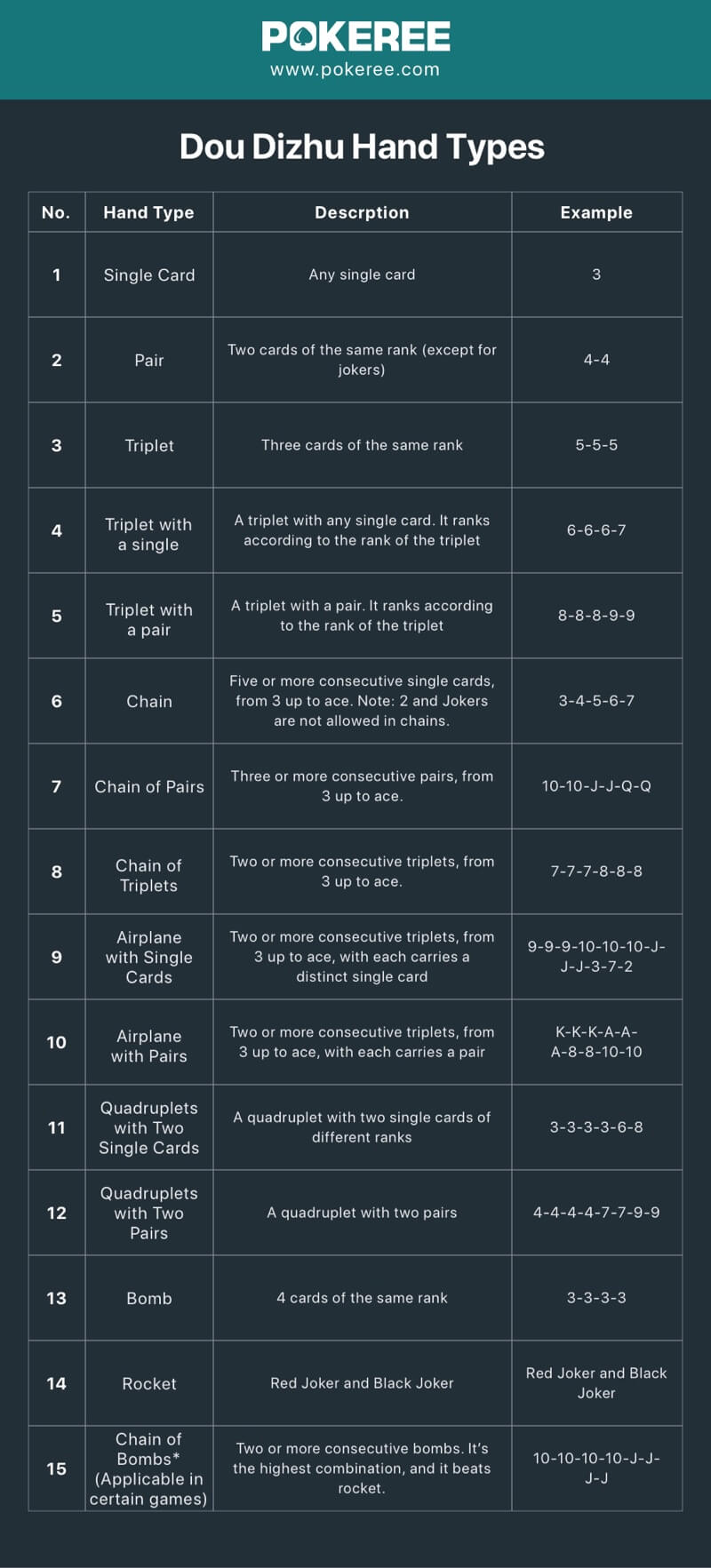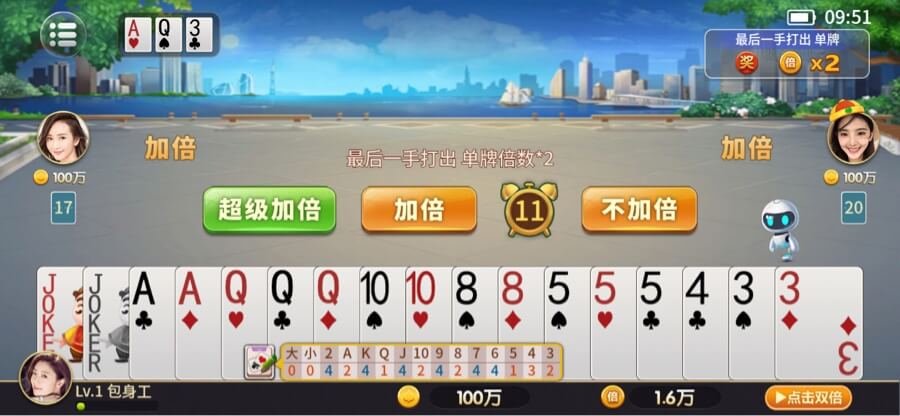Introduction
Dou Dizhu (simplified Chinese: 斗地主; traditional Chinese: 鬥地主, pinyin: Dòu Dìzhǔ; Jyutping: dau dei zyu; literally: "Fighting the Landlord") is one of the most popular card games in China. The game is played by 3 or more players, using a deck of 54 cards (including the jokers), one of which is the “landlord”, and the other two are “peasants”. The poker game was originated from Hanyang District, Wuhan City, Hubei Province, China. Dou Dizhu now has become one of the three most popular poker games in the world, along with Texas Hold'em and Baccarat.
Players, Cards and Deal
Players
The game is played among three people, one of them being the landlord(地主) and the other two being the peasants(农民). The peasants team up and compete against the landlord.
The goal of the game is to be the first player to run out of cards. The landlord wins by first removing all of their cards. If one of the peasants removes all of their cards first, the peasants win.
Cards
This game is played using a 54-card deck that includes two jokers, red and black. From highest to lowest, the cards are ranked as follows: red joker, black joker, 2, A, K, Q, J, 10, 9, 8, 7, 6, 5, 4, 3 (suits are irrelevant).
Deal
Three players are dealt a shuffled deck of 54 cards. One card is flipped face-up and inserted somewhere in the stack; this determines who will bid first. Each player is dealt 17 cards, with the remaining three cards kept face down on the playing deck.
Bidding
The landlord is determined by an auction. The player who received the face-up card in the deal is the first one to bid.
The traditional way is that the player who drew the face-up card starts bidding, and the possible bids are 1, 2 and 3. Each player may either pass or bid higher than the previous highest bet. If everyone passes, the hand is thrown in and a new deal will be started. If a bid is made, the auction proceeds counterclockwise, with each player passing or bidding higher than the preceding bidder until two consecutive players pass or someone bids 3, which stops the auction since it is the highest possible bid. The landlord is the final and highest bidder.
There has been a new way of bidding coming up in recent years; those who didn’t have a chance to bid could “double” the score if they believe that their hands are strong enough. If the highest bidder does not “redouble” the score, the player who chooses to double automatically becomes the landlord.
The three leftover cards mentioned earlier are then revealed to all players then dealt to the landlord.
Game Play
The landlord is the first to play, and he or she may use a single card or any legal combination. In a counterclockwise sequence, each subsequent player must either pass (play no card) or beat the prior play by playing a higher combination of the same number of cards and the same kind.
There are two exceptions:
1. A rocket can beat any combination
2. A bomb can defeat any combination except a higher bomb or rocket
The game is repeated around the table as many times as required until two consecutive players pass. The cards that have been played are then set aside, and the player who played the previous card(s) starts anew, leading any card or legal combination.
If the landlord has no cards remaining, he or she wins. If one of the peasants has no cards remaining, the peasant team wins.
Hands
Hand Types

Hands Comparison
1. Rocket is the highest combination; it beats anything else
2. Bomb ranks lower than rocket but higher than others. Bombs rank from three (low) up to 2 (high)
3. All hands except for rocket and bomb can only be compared with the same type of hand and the same number of cards.
4. When comparing the ranks of triplets with a single/pair, airplanes with singles/pairs and quadruplets with singles/pairs, the singles or pairs are irrelevant to the comparison; compare the primal cards only.
5. The Jokers and the 2 are not consecutive cards. Red Joker, Black Joker, and 2 cannot be included in any of the chains since they are not traditionally regarded as consecutive cards sequentially next to the Ace.
Scoring
Regular Game
If the landlord runs out of cards first, he wins, and each opponent pays him the amount of the bid - 1, 2, or 3 units - assuming no bombs or rockets were played. If one of the other two players runs out of time before the landlord, the landlord loses and must pay the bid sum to each opponent. Each time a player plays a bomb or rocket, the payout for the hand is doubled.
PC and Mobile Games
In most PC and mobile games of Dou Dizhu, there’s a scoring system whereby players are rewarded with point value when winning a game. Instead of bidding 1, 2, or 3, players have the options of “calling” for the position of the landlord, or “passing”, which means giving up bidding. Once a player chooses to “call”, players who didn’t choose “passing” have a chance to bid for the landlord by doubling the score. The previous caller could redouble the score to keep the landlord’s position, or they choose not to redouble and the player who doubles the score automatically becomes the landlord.
After the landlord and the peasants are decided, each player has another chance to “double” or “quadrable” the score if they think they are holding a very strong hand.
Same as the regular game, each time a player plays a bomb or rocket, the payout for the hand is doubled. If Chain of Bombs is applicable, the payout is tripled.
Below is an example hand of Dou Dizhu from JYou Mahjong app.




